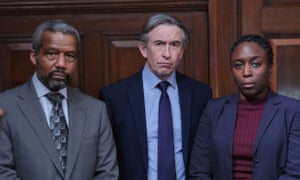‘This story isn’t over’: TV drama explores the legacy of Stephen Lawrence’s murder
Steve Coogan, Sharlene Whyte and Frank Cottrell-Boyce on their depiction of how Doreen and Neville Lawrence pursued justice for their son’s racist killing with veteran detective Clive Driscoll

Sharlene Whyte doesn’t just remember the racist murder of Stephen Lawrence in 1993. When the 18-year-old was fatally stabbed while waiting for a bus in south-east London, it was “one of the defining moments” of her teenage years.
“Now I have a son who’s 17,” says the actor, “and every time he goes out, I have fears for him in terms of safety on the streets and the attitude of some police. It would have amazed me to think, at the time Stephen Lawrence was killed, that, nearly 30 years later, the same issues would still exist. It’s better, but there are still big problems.”
The long legal and social consequences of the Lawrence case are the subject of Stephen, a three-part ITV drama screened later this month. Whyte portrays Stephen’s mother, Doreen, now Lady Lawrence for her decades of campaigning to bring her son’s killers to justice and for broader reforms in policing and racial equality. Hugh Quarshie plays Neville Lawrence, the victim’s father and Doreen’s ex-husband, just as he did in The Murder of Stephen Lawrence, an award-winning documentary-drama screened by ITV in 1999.
Executive producer of both projects, Mark Redhead, says that returning to the story in Stephen felt necessary because there is “unfinished business. I kept in touch with Doreen and Neville and became increasingly aware that this story isn’t over.”
The initial film followed events from the murder to the collapse of a private prosecution brought by the Lawrences in 1996 against three suspects after the Crown Prosecution Service ruled there was insufficient evidence for a criminal trial. Stephen dramatises a reinvestigation of the case by DCI Clive Driscoll, a veteran detective in the Metropolitan police’s Criminal Investigation Division (CID). With forensic evidence found by processes unavailable at the time of the murder – and helped by Doreen Lawrence’s over-turning of the “double jeopardy” law, which prevented retrial of those previously acquitted – Driscoll brought two of the suspects to trial and conviction at the Old Bailey, while fighting considerable hostility towards his efforts from within the Met.
Steve Coogan, who plays Driscoll, says: “I don’t often play nice people so it was a change to play someone with integrity – simple, unannounced integrity, if you like.”
Now retired, the 70-year-old Driscoll tells me on the phone (“I’m a bit old-fashioned about Zoom”) from his south London home what he found when he-opened the files in 2006: “From the very beginning, I felt there was a dislike of the Lawrence family, which I’d never encountered before towards the mum and dad of a murder victim.” Was that racism? “There were great detectives in CID. But I think there were also people who didn’t give a toss if it was a black man who got murdered.”
Driscoll says that DCI Gene Hunt, the bigoted boozer played by Philip Glenister in Life on Mars and Ashes to Ashes was “a pretty realistic depiction of a CID officer of that period. There was a huge drinking culture and it was almost acceptable to go for a drink with the bad guys.”
Driscoll is unusual in police drama because his status as a “maverick” (the preferred characteristic of telly cops) comes not from breaking the rules but going back to them – supporting the victim’s family, sympathetically interviewing witnesses, collecting evidence, in a way that earlier investigations had not.
“The first thing we said to Steve Coogan,” says screenwriter Frank Cottrell Boyce, “is that Clive is the exact opposite of a maverick cop: he is going to do the job properly.”
Joe Cottrell Boyce, the dramatist’s son and co-writer, adds: “Clive believes in the original [Metropolitan police founder] Robert Peel principles of policing by community consent. And that was where he and Doreen found common ground.”
“When I took over young Stephen’s case,” Driscoll explains, “I gave the Lawrences and the witnesses we were trying to persuade to give evidence my phone number, and said, ‘you can call me any time. If I’m crying, it means I’m watching Fulham FC play, but I’ll talk to you.’ And that wasn’t how things were supposed to be done in the Met then.”
Affectingly, Driscoll always calls the victim “young Stephen”, the age at which death froze him. (If he had lived, Lawrence would now be 46, and perhaps the architect he wanted to be.)
Although much of the crew (including the head of every production department) were people of colour, the fact that Driscoll and the co-writers are white will inevitably bring charges of the drama having a “white saviour” narrative. But producer Madonna Baptiste says: “It’s a realistic portrayal in that, in the end, it took three people to crack this.”
Unusually – and against the classic rules of drama, which allow only one protagonist – Stephen has a trio of protagonists: Doreen, Neville and Driscoll. “The case would not have gone to court,” says Redhead, “without Neville and Doreen and we try to present Clive in a fairly unheroic way as being the servant of their case. In the end, we are a mixed-race nation and people should work together happily and collaboratively, which is what happens in this case. And, in fact, on this production, which is made by people of different backgrounds.”
Frank Cottrell Boyce expects that “a lot of viewers will come into this thinking Clive is going to help Doreen. But it soon becomes clear that – from her decades of campaigning and meetings – she understands far more about the culture and problems of the Met and she helps him to understand that.”
That dynamic is illustrated in a moment when the investigation meets one of its many obstacles and Doreen casually tells Clive that she “can phone the home secretary”.
“In the editing,” says Baptiste, “there was a natural rhythm – a Clive moment, a Doreen moment, a Neville moment.”
“Doreen was, in effect, leading an investigation but wasn’t able to go in to do it,” explains Frank Cottrell Boyce. “Clive was sort of her man on the inside. So the structure replicates her weird situation of trying to take on an institution without being allowed through the door.”
The actors were given the choice of whether to consult their real-life models. Whyte chose not to: “I felt I wanted to keep a respectful distance from Doreen, although I found reading her book very helpful.”
Because her profile comes from public appearances expressing raw grief and campaigning zeal, Lady Lawrence has a public image of pained determination. So this dramatisation may surprise some.
“It was very much the aim to show the warmth and humour she has,” says Whyte. “Understandably, what comes across in public is her determination and her cause, but clearly there has to be a different private side as well, and that’s what we’ve tried to catch. The relationship with Clive is fascinating because it is a friendship that grew from mutual respect and shared values that might, in other circumstances, have become a romance.”
Clive Driscoll is pleased by the script’s emphasis: “Doreen Lawrence is nothing like people think she is. She’s an amusing and friendly person in a way that, in the circumstances, wasn’t going to come across in public.”
During pre-production, Steve Coogan had a three-hour phone call with Driscoll, who remembers: “He didn’t really ask me about the story. He asked me why I was so keen to take young Stephen’s case, and why I thought it went differently when I took it over. I said I decided just to investigate it as a murder and ignore all the razzmatazz around the story. And we talked about how sometimes it can be better to be practical rather than highly educated. I have a Grade C in woodwork. But is someone with all these degrees necessarily a better detective?”
During that long conversation, Coogan recalls: “I asked Clive why he hadn’t become corrupt like so many coppers of his generation. And he said that his mum had brought him up a certain way and so taking back-handers or whatever would have been letting her down.”
“He’s far better looking than me,” adds Driscoll of Coogan. “He’s never going to be a body-double. But people tell me he’s got my accent off.”
Redhead sent the writers a list of what he calls “Clive-isms”, such as: “They call it common sense but it ain’t that common.” Driscoll laughs loudly at this: “I think my kids and my colleagues might call them something worse than Clive-isms. It’s me. It’s how I am. When I first joined the force, I really hated it and I realised I was trying to be some idea of what a police officer should be. I actually resigned and someone advised me to just be myself, and, after that, I loved it. Doreen Lawrence always says that she knew that if I’d made a cock-up I’d tell her.”
Stephen joins the small sub-set of dramas (including Waiting for Godot and Abigail’s Party) in which the title character does not appear. The dead teenager has a presence only in photographs on walls and in court-room evidence. Another memorial, explains Baptiste, is that, in the musical score by Segun Akinola, “there is a leitmotif that represents Stephen, so, when you see his clothes or he is mentioned, he is there subliminally.”
Although there were at least three other suspects, Driscoll was “compulsorily retired” after achieving two convictions in 2011 and the Met last year announced that the investigation is now closed.
“I know [the Lawrences] feel that there was no willingness or enthusiasm at the Met to carry on,” says Driscoll. “The bosses just wanted it to go away, but it won’t ever. I always said the best way to make it go away would be to solve it. Then it’s gone.”
The retired detective also points out that Stephen isn’t just about an old case: “As much as it breaks my heart to say it, young men being killed with knives on the streets of London isn’t uncommon.”
“It does feel like there’s been an improvement,” says Baptiste. “People notice racism more and want to change things. We just mustn’t think that’s enough. There’s a long way to go.”
Driscoll says he “speaks to Doreen Lawrence maybe twice a month, pop over for a cup of coffee. Mr Lawrence I call up in Jamaica now that I’ve worked out the time difference. He asked me why I always called him at three in the morning and I had to be honest and say that it was because I was under the impression it was three in the afternoon there.” He sees Stuart Lawrence, Stephen’s surviving brother, at football matches.
In TV dramas, retired cops have dreams and nightmares about old cases. Does he? “It was a massive privilege to investigate young Stephen’s case. I don’t know if it’s a nightmare but there were a couple of leads or opportunities [on the other killers]. And I wish I’d had the chance to satisfy myself if that evidence was good, bad, or indifferent. And my dream, I suppose, is that this drama will prick someone’s conscience to come forward with the information that will allow Lady Lawrence and Mr Lawrence and their families to have some closure. It may be a naive dream but that’s what I want because we should be grateful to them for helping to expose weaknesses in our system which hopefully we’ve been able to start to plug.”
Stephen is on ITV later this month.



